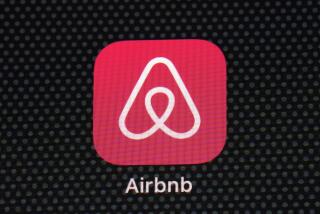Editorial: Hotels should have the right to challenge police demand for guest data
When you register at a hotel in Los Angeles, you are sharing your personal information not only with the management but potentially with the police as well. A city ordinance requires hotels and motels not only to keep a record of the names, addresses, vehicle information and method of payment of their guests, but also to turn over that information “to any officer of the Los Angeles Police Department for inspection” on demand. No warrant or subpoena is required.
On Tuesday, a lawyer for the city told the U.S. Supreme Court that the ordinance was a constitutional way to prevent hotels from playing host to prostitutes, drug dealers and other criminals. A lawyer for an association of hotel owners countered that before giving information about guests to the police, a hotel operator at least should have the right to challenge the request before a judge. The group’s concern is that the law allows police to harass hotel managers with demands for information at all times of the day or night.
We agree with the hotel owners. Although the city defends its ordinance as a form of “administrative” regulation, it seems more like a license for police to engage in fishing expeditions for criminal behavior even when they don’t have probable cause. Allowing hotel managers to challenge requests for registers would discourage such intrusions. (In emergency or “exigent” situations, police can seize and search records without a judge’s permission.)
Welcome as a decision for the hotel owners would be, it is unlikely to address what most hotel guests probably would see as the real issue: whether they have a reasonable expectation of privacy in the personal information they provide at the registration desk. That’s because Tuesday’s arguments — like a lower-court decision in the hotels’ favor — focused on whether the Los Angeles ordinance violates the privacy of the hotels, not that of the guests.
That narrow focus is the result of a 1979 decision in which the Supreme Court held that individuals have no expectation of privacy in information they willingly turn over to a third party. But that doctrine makes much less sense in the digital age, in which, as Justice Sonia Sotomayor has noted, “people reveal a great deal of information about themselves to third parties in the course of carrying out mundane tasks.” The best example is the information about the time, source and duration of telephone calls that the National Security Agency has been scooping up.
Perhaps not in this case, but at some point the Supreme Court must act on Sotomayor’s insight and extend the protection of the 4th Amendment to information Americans must share with private businesses — whether it is the record of their Internet activity or the credit card information they give to a hotel.
Follow the Opinion section on Twitter @latimesopinion and Facebook
More to Read
A cure for the common opinion
Get thought-provoking perspectives with our weekly newsletter.
You may occasionally receive promotional content from the Los Angeles Times.






